Overview
The article outlines ten strategies for developing an entrepreneurial mindset, emphasizing traits like creativity, resilience, and adaptability as essential for success in business. It supports this by detailing practical strategies such as setting clear goals, embracing failure, and actively seeking feedback, which collectively foster a proactive and growth-oriented approach necessary to thrive in today’s dynamic job market.
Introduction
In an ever-evolving job market, the journey toward entrepreneurship presents both challenges and opportunities that require a unique mindset. An entrepreneurial mindset is not merely a trait; it is a collection of characteristics such as creativity, resilience, and adaptability that can be cultivated over time.
As individuals navigate career transitions, understanding and embracing these traits becomes crucial for success. By fostering a proactive approach to problem-solving and learning from failures, aspiring entrepreneurs can transform setbacks into stepping stones toward their goals.
This article delves into the core attributes of an entrepreneurial mindset, practical strategies for its cultivation, and the importance of resilience and a supportive network in achieving entrepreneurial success. Exploring these insights can empower individuals to not only thrive in their ventures but also reshape their professional paths with confidence and determination.
Core Characteristics of an Entrepreneurial Mindset
An entrepreneurial mindset is defined by essential traits such as creativity, perseverance, adaptability, and a proactive approach to problem-solving. Creativity allows innovators to identify opportunities where others perceive roadblocks, while resilience aids them in recovering from setbacks and continuing toward their goals despite challenges. In a rapidly evolving market, adaptability is crucial; the ability to pivot and adjust strategies as circumstances change sets successful business leaders apart from others.
A proactive attitude encourages individuals to take initiative and act decisively, rather than waiting for opportunities to present themselves. Huber’s insight that ‘the good news is personality traits are actually moldable to some extent’ reinforces the idea that these characteristics can be cultivated over time, which is particularly relevant for those navigating the Battered Career Syndrome and Investor Syndrome. The importance of developing these traits is underscored by the fact that around 50% of businesses in the US are home-based, revealing diverse paths to entrepreneurship.
Moreover, between 1995 and 2020, small businesses created 12.7 million net new jobs, outpacing their larger counterparts. Insights from the case study ‘Factors Influencing Entrepreneurial Success’ reveal that factors such as state worker-age population growth and venture capital availability significantly impact business outcomes, with states like Utah and Florida showing favorable conditions for startups. Therefore, embracing and refining these key traits is a vital step for career transitioners who are focused on developing an entrepreneurial mindset to cultivate a successful business outlook.
For more insights and strategies on navigating the challenges of the Battered Career Syndrome and Investor Syndrome, consider exploring ‘Your Career 2.0: A Survival Guide for The Battered Career Syndrome and Investor Syndrome.
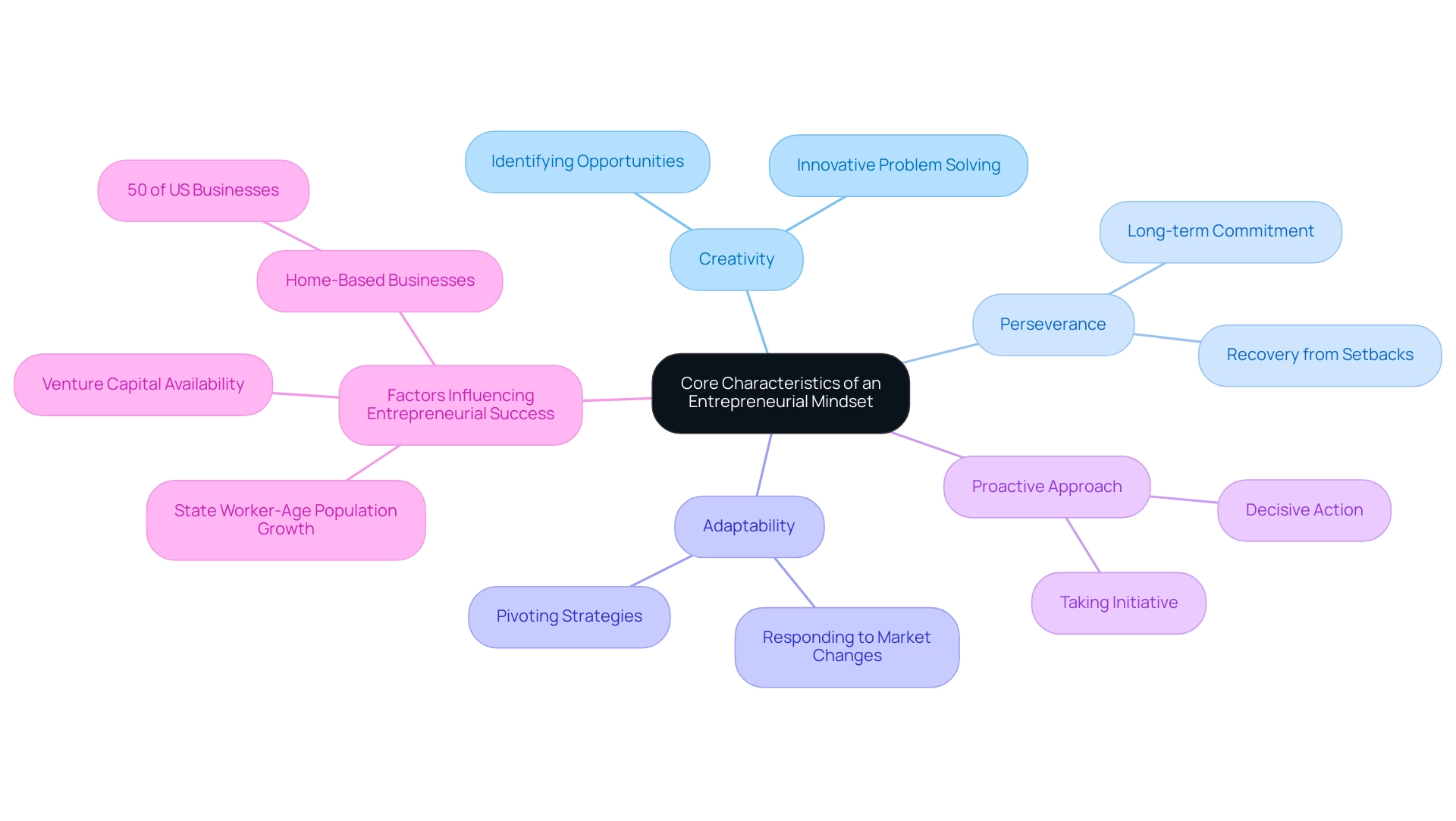
Practical Strategies for Cultivating an Entrepreneurial Mindset
To develop a business-oriented mindset in today’s changing job market, particularly taking into account the challenges of employability and age factor limitations, consider implementing the following strategies:
-
Set Clear Goals: Defining what business success means to you is crucial. Documenting your goals not only increases accountability but also aligns with the growing trend of self-employment, with predictions of 10 million self-employed workers by 2026.
-
Embrace Failure: Shift your perception of failure to see it as a powerful opportunity for growth. Many business owners, especially those who faced challenges during the pandemic, have learned invaluable lessons from setbacks, with 51.9% of small businesses successfully utilizing financial assistance from the Paycheck Protection Program (PPP) to persevere through difficult times.
-
Continuous Learning: As the business environment changes, so should your skillset. Staying updated on industry trends is essential, especially considering that the average entrepreneur in the U.S. starts their journey at 42, highlighting the need for ongoing education to remain competitive in a job market where positions are often short-lived.
-
Seek Feedback: Regularly soliciting feedback from peers and mentors can enhance your ideas and approaches, fostering innovation. As Kath Kyle, leader of the Hustle-Less, Manifest-More Movement, notes,
I’ve helped thousands of customers to transform their lives and have built audiences of over 28 million people.
This highlights the power of community involvement and constructive feedback in your business journey.
-
Practice Mindfulness: Incorporating mindfulness practices can improve focus and reduce stress, leading to clearer decision-making.
By incorporating these strategies into your daily routine, you can cultivate the top developing an entrepreneurial mindset that is resilient, adaptable, and focused on achieving not just financial freedom, but also personal agency in a changing economy. In light of the declining career economy, these strategies are essential for mitigating risks and fast-tracking your path to financial independence.
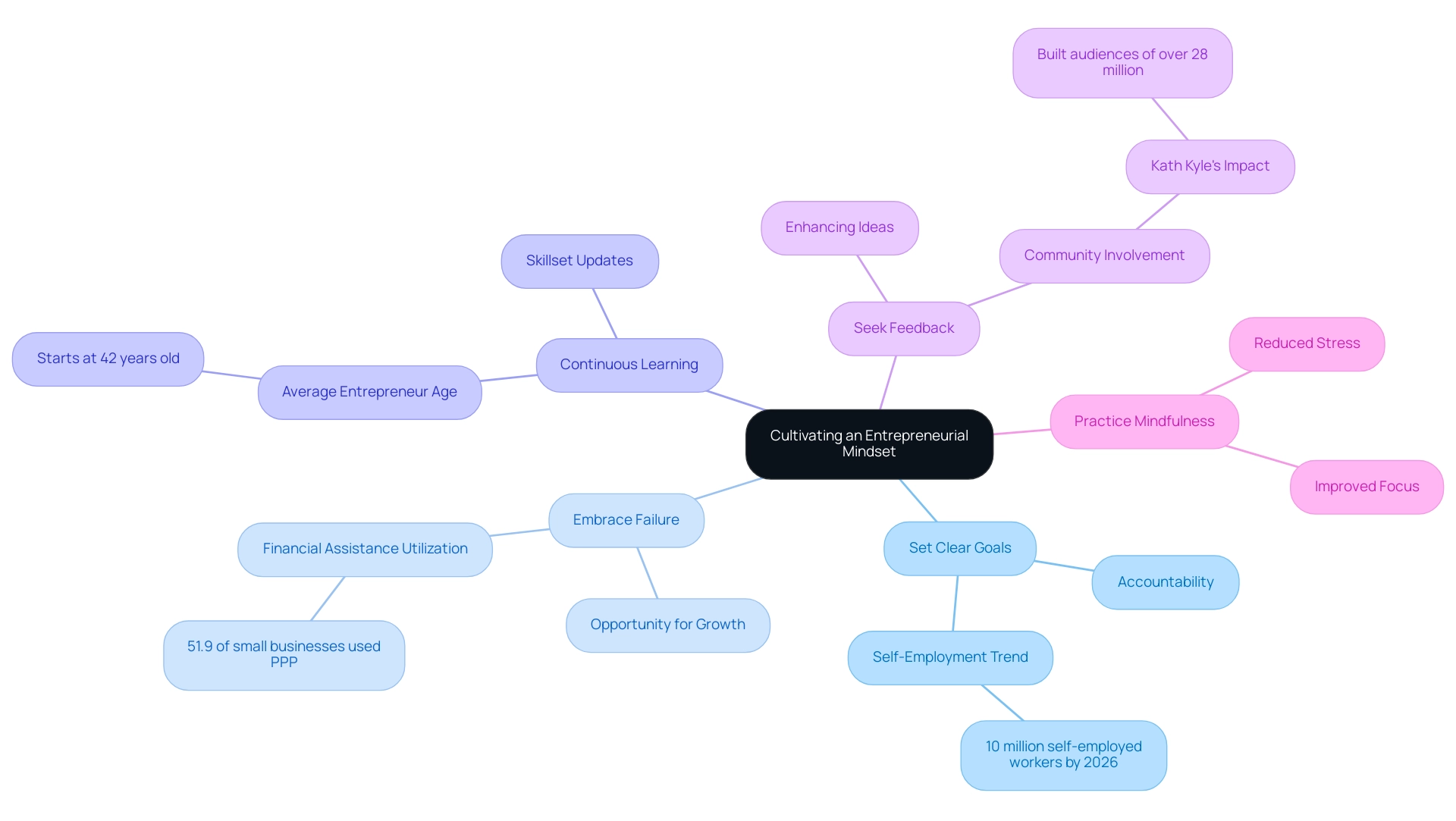
The Role of Positive Attitude and Self-Confidence in Entrepreneurship
The significance of a positive attitude and self-confidence is among the top factors in developing an entrepreneurial mindset. These attributes influence how business owners approach challenges and empower them to inspire others. A positive mindset is one of the top factors in developing an entrepreneurial mindset, as it cultivates resilience and enables individuals to face setbacks with optimism and determination.
Research indicates that the top business owners developing an entrepreneurial mindset with a positive outlook are better equipped to navigate the complexities of running a business. Self-confidence plays a crucial role in developing an entrepreneurial mindset; it propels business owners to take calculated risks and pursue their ambitions with unwavering conviction. For instance, the statistic that 31% of business owners have successfully transformed their dreams into reality with only an associate degree underscores the importance of believing in oneself as a driver of success in business.
This belief is especially crucial when confronting major challenges, such as recruitment and customer acquisition, which 56% of business owners recognize as obstacles in their journeys. To cultivate these essential qualities, consider integrating practices such as:
- Positive affirmations
- Success visualization
- Surrounding yourself with a supportive network that encourages your growth
Moreover, specific case studies reveal that individuals who maintain a positive attitude are among the top in developing an entrepreneurial mindset to overcome these challenges, demonstrating that a robust belief in oneself is often the catalyst for achieving success in business.
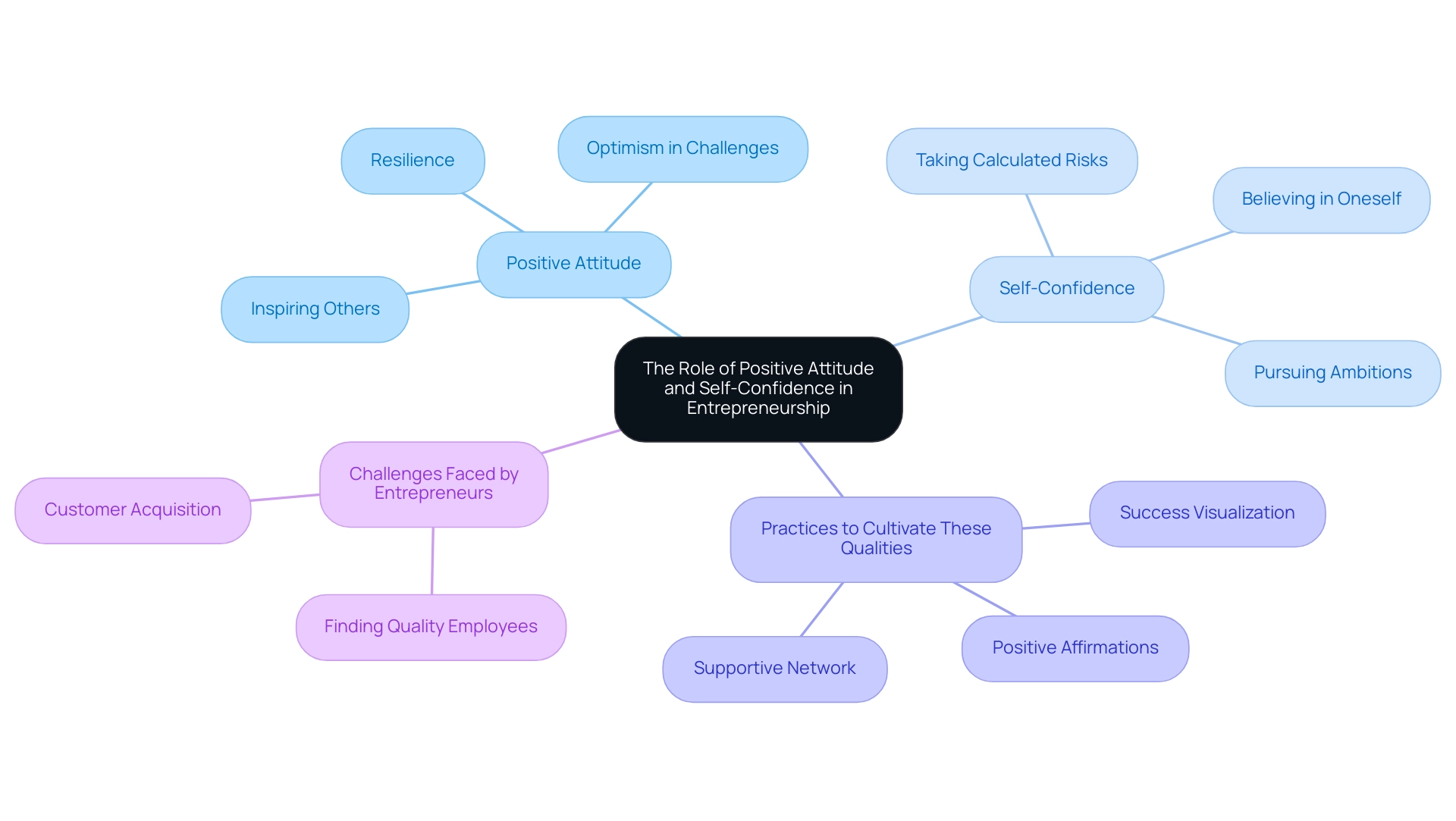
Embracing Resilience: Learning from Failure as a Path to Success
Resilience is a cornerstone trait for entrepreneurs, highlighting the importance of developing an entrepreneurial mindset, as the journey to success is often riddled with obstacles. Embracing failure is among the top strategies for developing an entrepreneurial mindset, as it encourages perseverance and transforms setbacks into valuable learning opportunities. Take, for example, the journey of Thomas Edison, who famously encountered thousands of failures before achieving his groundbreaking inventions.
The insights from Shepherd et al. further elucidate this concept, stating that the ability to recover is fundamentally about how individuals or organizations build and utilize their capabilities to adapt positively to challenges. This process is essential before, during, and after challenges.
To develop strength, engage in self-reflection after setbacks to identify lessons learned, and make necessary adjustments to your approach. Additionally, maintaining a robust support network can provide essential encouragement and perspective during difficult times. Current research under the affect-as-information theory highlights how emotions can significantly influence entrepreneurs’ evaluations of perceived threats, thereby impacting their ability to recover.
In a quantitative perspective, the mean score for recovery in South dummy stands at 0.273 with a standard deviation of 0.445, indicating variability in how recovery manifests among entrepreneurs. This highlights the significance of customized strategies to improve adaptability. Moreover, the standards set for incorporating studies in this area—where 1,400 research works were omitted for not demonstrating a connection between strength and business ventures—highlights the thoroughness of the research backing these assertions.
As you navigate your business journey, keep in mind that each failure is not merely a setback but a step nearer to achievement. This perspective is among the top ways of developing an entrepreneurial mindset, enabling you to flourish in the face of challenges and emphasizing that toughness is not just an inherent quality but a capability that can be cultivated through experience and contemplation. Furthermore, understanding how business behaviors enhance resilience in small and medium enterprises (SMEs) can provide valuable insights for your journey.
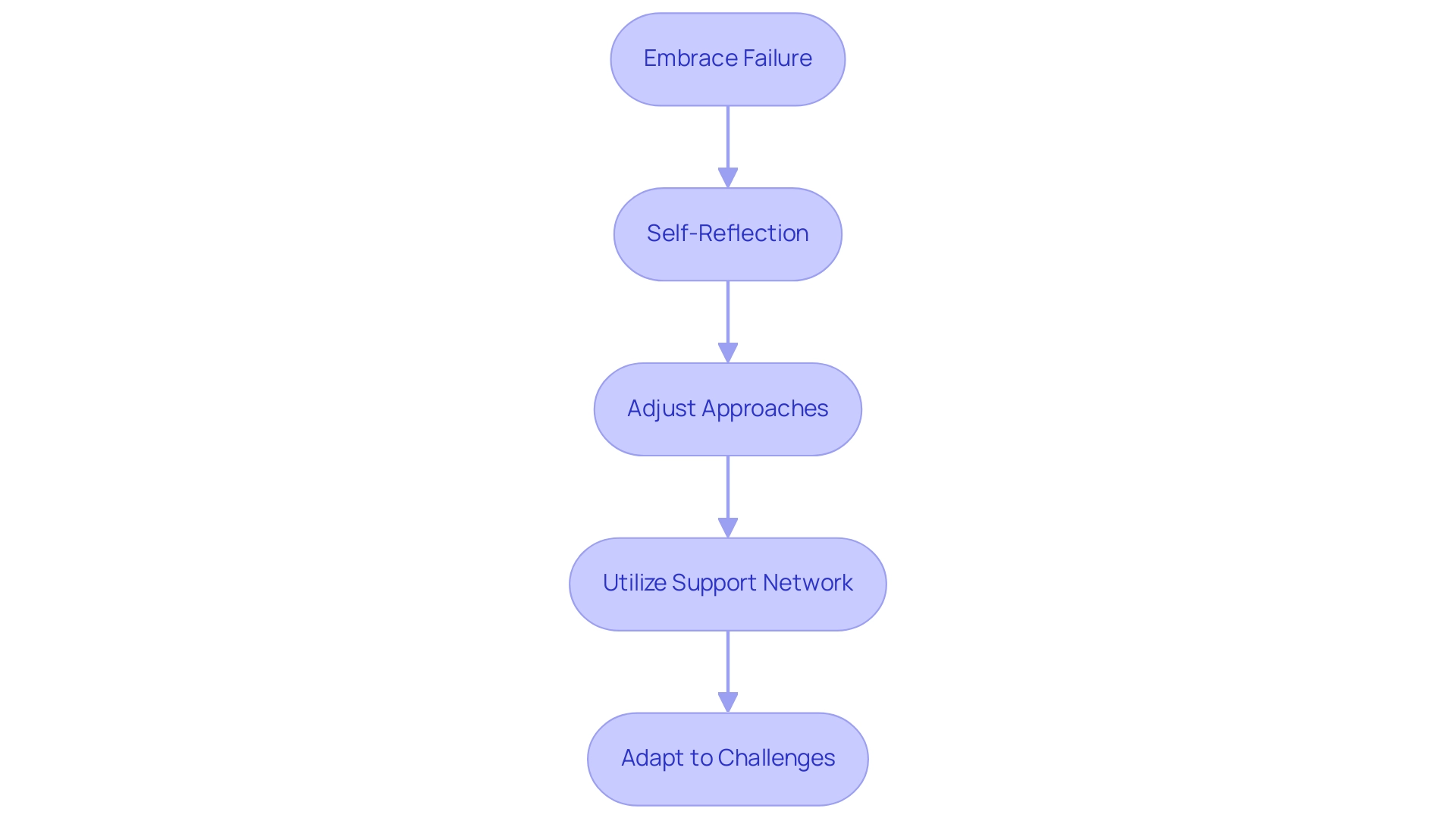
Networking and Collaboration: Building a Supportive Entrepreneurial Community
Networking and collaboration are cornerstones of a business mindset, laying the groundwork for success in today’s competitive landscape. Engaging with a supportive community can yield invaluable insights, resources, and encouragement essential for your journey. The upcoming International Business Ownership Expo in New York City from May 30th to June 1st, 2024, offers a unique opportunity for aspiring entrepreneurs to connect with over 300 franchise brands and industry experts.
This event exemplifies the power of relationships in shaping career paths, as a report by Jobvite highlights that 18% of workers found their current roles through connections made in their networks.
To harness this potential, consider:
- Attending industry events like the Expo
- Joining business organizations
- Participating in online forums where ideas flourish
Social media platforms, particularly LinkedIn, serve as excellent avenues for connecting with like-minded individuals, sharing ideas, and expanding your reach. Recent trends indicate that active networking significantly enhances business performance, contributing to increased profitability, revenue growth, and innovation.
Notably, a survey found that 11% of respondents felt their most effective networking experiences were in person, emphasizing the value of face-to-face interactions.
As you build your network, focus on diversifying it by asking for introductions and connecting with individuals outside your immediate circle. This approach can lead to innovative solutions and collaborations that further your business aspirations. In navigating the challenges of a declining career economy, especially for veterans, remember that cultivating diverse networks is crucial for overcoming obstacles like fundraising and talent sourcing.
Engaging with mentors and peers who can support and inspire you is essential for developing an entrepreneurial mindset; leveraging collaboration not only enhances your entrepreneurial ventures but also nurtures a resilient mindset geared for success. Don’t miss the chance to register for the International Business Ownership Expo and download the free Veteran Entrepreneur® Program presentation to gain valuable insights and resources tailored for your journey in developing an entrepreneurial mindset. Explore the various educational seminars available at the Expo, designed to equip you with the knowledge and skills necessary for successful franchise ownership.
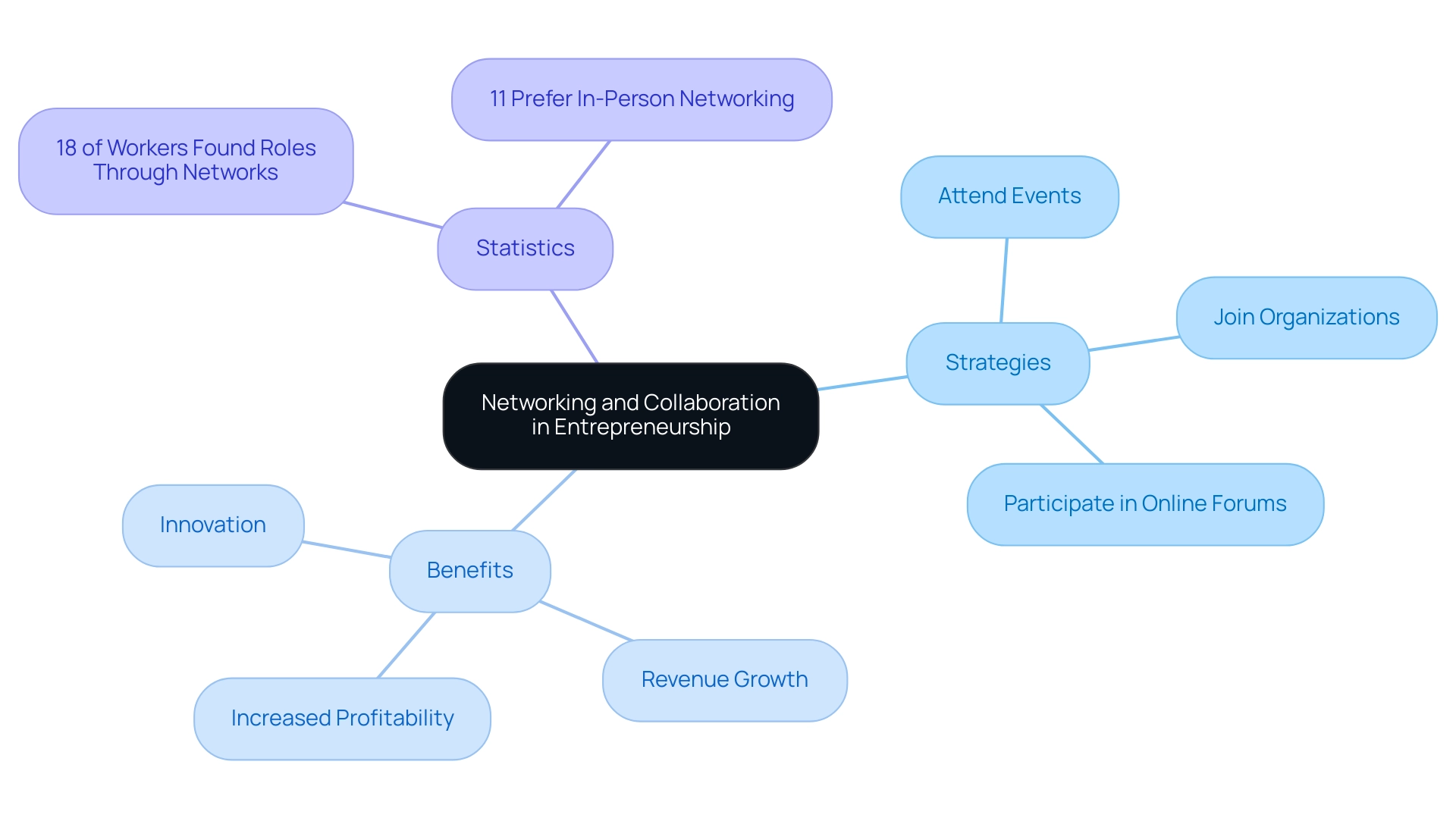
Conclusion
In navigating the complexities of entrepreneurship, cultivating an entrepreneurial mindset is paramount. This mindset encompasses essential traits such as creativity, resilience, adaptability, and a proactive approach to problem-solving. By embracing and refining these characteristics, aspiring entrepreneurs can transform challenges into opportunities, positioning themselves for success in a dynamic job market.
Implementing practical strategies is equally crucial. The following are vital steps toward fostering resilience and adaptability:
- Setting clear goals
- Embracing failure as a learning opportunity
- Committing to continuous learning
- Seeking feedback
- Practicing mindfulness
Each of these strategies not only enhances individual capabilities but also prepares one to thrive amidst the uncertainties of the entrepreneurial journey.
Furthermore, the importance of a positive attitude and self-confidence cannot be overstated. These attributes empower entrepreneurs to tackle challenges head-on and motivate those around them. Building a supportive network through networking and collaboration amplifies these efforts, providing essential resources and encouragement. Engaging with like-minded individuals and participating in events can significantly enhance one’s entrepreneurial journey, fostering innovation and growth.
Ultimately, the path to entrepreneurship is marked by resilience and the willingness to learn from setbacks. By embracing these principles and actively cultivating an entrepreneurial mindset, individuals can reshape their professional trajectories with confidence and determination, paving the way for a successful and fulfilling entrepreneurial journey.


